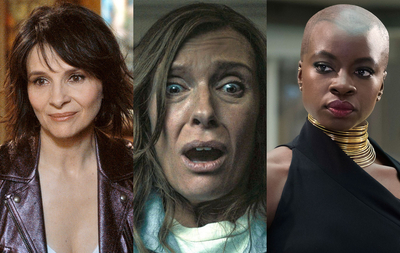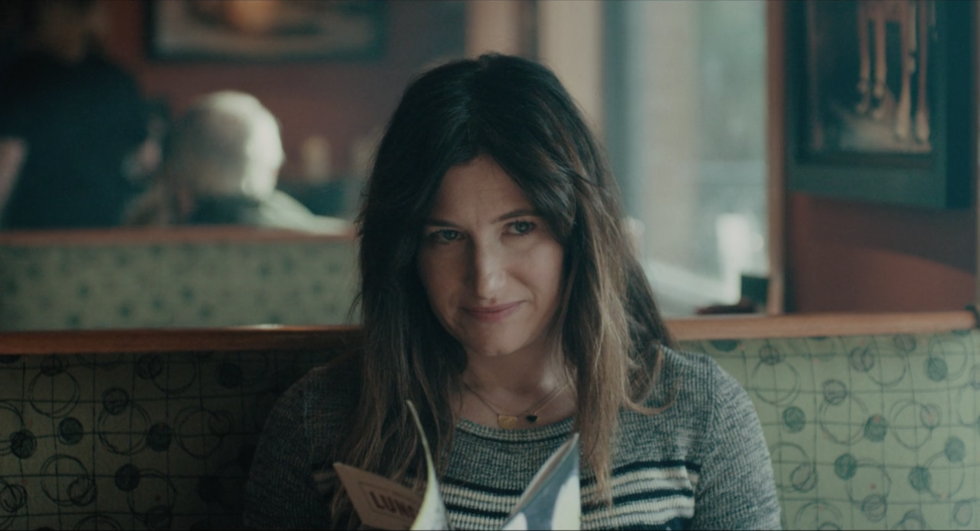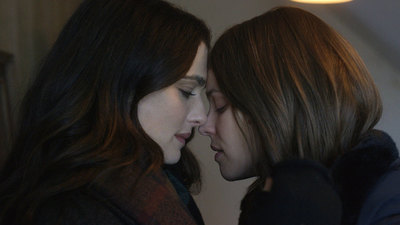
BY MATTHEW ENG |
The Business of Being: A Conversation with Kathryn Hahn
In Tamara Jenkins' Private Life, Kathryn Hahn brings another of her striving, everyday women to the big screen and delivers one of 2018's finest performances.

There's a unique form of joy in seeing an underutilized actor you've long admired finally receive the meaty roles that her talent warrants. There was always more to Kathryn Hahn than the boisterous, go-for-broke comedian usually held on the sidelines of movies like Step Brothers, Wanderlust, and The Secret Life of Walter Mitty. Hahn has spent the better part of this decade realizing that potential in parts that rely on her unique gift for pathos-driven humor, an ability to express as much ruefulness in a silent close-up as a punchline. On screens both big and small, she continues to add portrait after portrait to an exquisitely-wrought gallery of real, multidimensional American women each searching for purpose, from the stultified stay-at-home mom radically reorganizing her living situation in Afternoon Delight to the heavy-hearted, slowly spiraling rabbi of Transparent to the invigorated filmmaker making art out of perverse obsession in I Love Dick.
Hahn excels yet again in Tamara Jenkins’ incredible Private Life, in which the actress stars alongside Paul Giamatti as Rachel and Richard, an artistic Manhattan couple whose fruitless and unending attempts at having a child have given them no shortage of grief and frustration. After another failed round of IVF, the couple decide to solicit the eggs of their 25-year-old, nonbiological niece (Kayli Carter), a last resort that only makes matters more complicated and pushes husband and wife towards a series of uncomfortable truths. Hahn’s performance flawlessly matches the tenor of Jenkins’ emotionally complex comedy, summoning Rachel’s pronounced need with both dry observation and plaintive longing. She plays this character, as she does all of her characters, like she has lived her life long before the opening shot.
I recently spoke with Hahn about this watershed moment in her career, the magic of co-star chemistry, and the screen performances that directly shaped her creative pursuits.

During this year’s Hollywood Reporter actress roundtable, you talked about being surprised by the richness of the parts you’ve been able to play at this stage of your career after feeling disconnected from the roles you were handed early on. What do you attribute this upswing to? When did you get the sense that directors and creators were starting to see you in a new light?
I think that there was a real sense of just walking towards the light. I can’t describe it any other way. I was walking, more specifically, towards people who were interested in me, rather than fighting for something that I was not a fit for. I was trying to fit into boxes that maybe weren’t made for me, rather than using myself and bringing myself to these humans. And it’s no coincidence that it has been creative women that I’ve met that have seen something in me and asked the most of me as an actor and offered me these rich and dynamic and complicated and juicy roles at this stage in my life.
I know that Tamara Jenkins spent a lot of a time working on Private Life and trying to get it off the ground for a long time, but it’s still a travesty that we had to wait 11 years for a follow-up to The Savages.
A lot of that time was her going through what she wrote about in the screenplay because she was in the process of becoming a mother and starting a family. And she would say that the material in this is emotionally autobiographical, for sure. I think she said it took two years to write this script, and then it certainly did take time to get this movie off the ground, which is a total shame and something to listen to, in and of itself.
It’s crazy to see some of these year-end lists and see so few women directors being celebrated, despite directing so many incredible movies. It definitely is a harder hustle. Even the phrase “female directors” gives me the creeps. It can’t quite be this director’s film or actor’s film. It’s almost like a sidebar. You know what I mean? It’s so weird.
“Women” has become its own genre.
[The phrase] “women in Hollywood” is also so strange to me, as if it’s this new sideshow thing, rather than just artists or actors or filmmakers. It still feels niche and bizarre.
But [Tamara] is also a filmmaker of such integrity and truth-telling that she’s not gonna just throw something together without taking the time to dig for the truth and make it the best. And it’s absolutely the story that she wants to tell. She’s not gonna compromise. And I respect the shit out of that. It’s really difficult to do — really difficult to do. [Private Life] is such a metaphor for filmmaking or any kind of making. [The characters] are [thinking], If we do this one little thing then maybe we’ll get the baby. And when you’re a filmmaker, you just think, Ugh, if I do this one little thing then maybe I’ll get my movie made. But what might it cost? It’s such a difficult journey to get any movie made, especially when it’s your baby and it’s not spearheaded by a thousand guys at the head of this big studio. There’s not so much machinery behind it. It’s just your story that you wrote and that your heart and soul have been bled into. You don’t want to compromise it. So I have such deep awe and respect for anyone that gets it made that way, now.

How did the narrative, but also the character of Rachel, evolve over time? Did you contribute anything specific to the development of the character?
When I was handed the script, it was pretty bulletproof because Tamara had taken such time and care and soul and such diligence. It was all there. I didn’t need to go outside of it very much. I just needed to be open and receive Paul, really. And Kayli. And Molly [Shannon] and John [Carroll Lynch] and all these incredible actors. And this incredible DP, Christos [Voudouris]. I just had to allow myself to basically surrender to the mystery of what would happen on the day.
There was so much support that Tamara and I never talked about. And she would never say this or articulate it, but I think [Tamara] seeped into me a lot during the making of [the film]. I did feel, in some unconscious way that I didn’t even realize until after the making of it, that there was a lot of Tamara in [my performance]. Just in the way that [Rachel] moved and her syntax and the way that she talked. Not all of it, believe me. But there was a large part of [Tamara], for sure. And nothing was ever really decided beforehand, it just happened.
But also so much of Rachel is found in Paul’s Richard. We kind of met each other as [separate] characters, we really did. It was only until we really started working together that that changed, and Richard and Rachel started to reveal themselves and their mentality. This yin and yang couple became a kind of marriage organism. [Laughs] We never talked about it. It just happened. We were in it really deeply, from the very beginning. It was just magic, a complete mystery.
You and Paul depict one of the most believable long-term marriages I’ve ever seen on screen, one that’s all the more realistic because it never exists along a good-or-bad dichotomy. So many of the problems in this marriage are only simmering under the surface and boil over without warning, as they often do in real life. But there is also clear comfort and indisputable affection between the two. A lot of that is inherent in the script, but it’s also a testament to the lived-in quality of your work and Paul’s. Do you find that that process of building intimacy with a co-star occur just as often off-screen, before and after the cameras are rolling, as it does when you’re in the moment?
I am never really interested in talking about a relationship with an actor. I never find it helpful. It always feels kind of false. If it helps the other actor, I [am] so open to doing it. I’m so open to it. [But] I never instigate it, talking about or making up a shared history. I always find it a little more mysterious when it’s not locked in. It’s always more helpful to just be with somebody and not be too precious, to just hang as much or as little as you need. You kind of Spidey sense it. The safety happens when that bubble [goes up as] the cameras roll. You find that safety there. You just receive what the actor’s giving you and you just give — and then history just starts to happen. That’s what I feel [happens], I really do. If you have done your work on what the script has given you and your scene partner has done their work, you just trust. Even if they haven’t done their work, if you just trust then that history starts to reveal itself, and it’s there. And I’ve never had a problem with that. I’ve been really lucky recently with chemistry; it just seems to work. When I was young, I really liked to talk it out a lot, and the work always seemed to lose something. You’re holding on to an idea you discussed together and it kind of freezes you… I don’t know if that makes any sense, but I just prefer it when things are open.
One of the things that I think really sets your roles apart from those that we tend to see in contemporary stories about women is that your characters always seem to be grappling with a force so much larger than mere romance or the minutiae of daily life. That definitely feels true of Private Life, but also Afternoon Delight, Transparent, and I Love Dick (pictured below), where the women you play are working through various crises involving art, desire, religion, patriarchy, and a profound lack of fulfillment.
Big themes. [Laughs]

Are you approaching your performances with these thematic concerns in mind or are you grappling with your characters more organically, on a moment-to-moment basis? Your character arcs remind me of that point in the 1970s when actresses like Gena Rowlands and Faye Dunaway were making their names in movies by playing women who weren’t just love interests but fighting their own insurmountable battles.
Oh my god, Matthew! That’s crazy! I would say I never think about the theme… I mean, first of all, that’s crazy to be put in the same sentence as those two goddesses. But I never think thematically. I always have to just burrow myself into the “I” of the script, the “Who am I?” It gets me in trouble if I think politically, if I frame it politically or in a social way. That’s not my business when I’m acting. If I step outside of it and see what I’ve made then I can, or of course when I first read it and think about what I’m getting myself into. But when it comes to the doing of the work, I can’t. You know what I mean. You don’t want to impose your own moral code or ethics or morality. I just have to burrow into the character and get myself out of the way in order to dig into her. And then just ride that ride, and look at it afterwards and read into it. If I try to think big picture then I dilute it with my own nonsense and my own feelings. I try to take care of the theme by feeling it instead of telling it.
I’m curious about what performances have not only influenced you but defined the type of actor you want to be.
It’s always Gena Rowlands. A Woman under the Influence is enormous.
It’s the best performance ever.
Ever. Ever. She just destroys me. And also Meryl Streep in Sophie’s Choice. And Kevin Kline in that movie. I remember seeing a movie called Camille Claudel when I was in high school, and I just remember [Isabelle Adjani’s] beautiful face looking so sad, and I sat there for three hours in this art house staring at her. It really got to me. I was so taken with it. And now I think about it and I’m like, God, that’s kind of complicated. But when I saw it, I just kept thinking, God, the most beautiful woman is in front of me. And it was so interesting to me during I Love Dick. I brought it up to [writer] Sarah Gubbins when we were making it because [the character] just went mad making [Auguste Rodin’s] art and never getting the recognition.
She’s like the world’s most beautiful volcano in that movie, it’s mind-blowing.
Yes! It’s mind-blowing. I have to see that again... So that is something that is really stuck in me. And I just remember Wild at Heart really got under my skin when I was in high school. Both Nicolas Cage and Laura Dern's performances really made me feel, and Willem Dafoe in that performance, that scene. And of course Shirley MacLaine. And Teri Garr, she has amazing scenes in Tootsie. And Holly Hunter, who’s so incredible… But Gena Rowlands is at the top of it for me.

